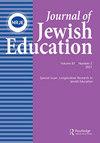Learning to Learn with a Havruta: Pragmatic and Ethical Facets
IF 0.4
Q4 EDUCATION & EDUCATIONAL RESEARCH
引用次数: 0
Abstract
ABSTRACT What are students’ perceptions of havruta learning after osmotic socialization? This osmosis is achieved solely by observing and emulating behaviors from other havruta learners. Perceived benefits include improvement of thinking and social skills and correcting misunderstandings, whereas challenges include the limitation of one’s freedom and a sense of missing additional learning opportunities. Particularly relevant for educators seeking to cultivate intentional havruta practices among students., these findings underline the need for a nuanced pedagogy that is highly attentive to students’ spontaneous discovery of pragmatic and ethical insights, as well as how enhancement of the ethical dimension of havruta may support students’ engagement with personal challenges in this learning format.用哈夫鲁塔学习:务实与伦理
本文章由计算机程序翻译,如有差异,请以英文原文为准。
求助全文
约1分钟内获得全文
求助全文

 求助内容:
求助内容: 应助结果提醒方式:
应助结果提醒方式:


